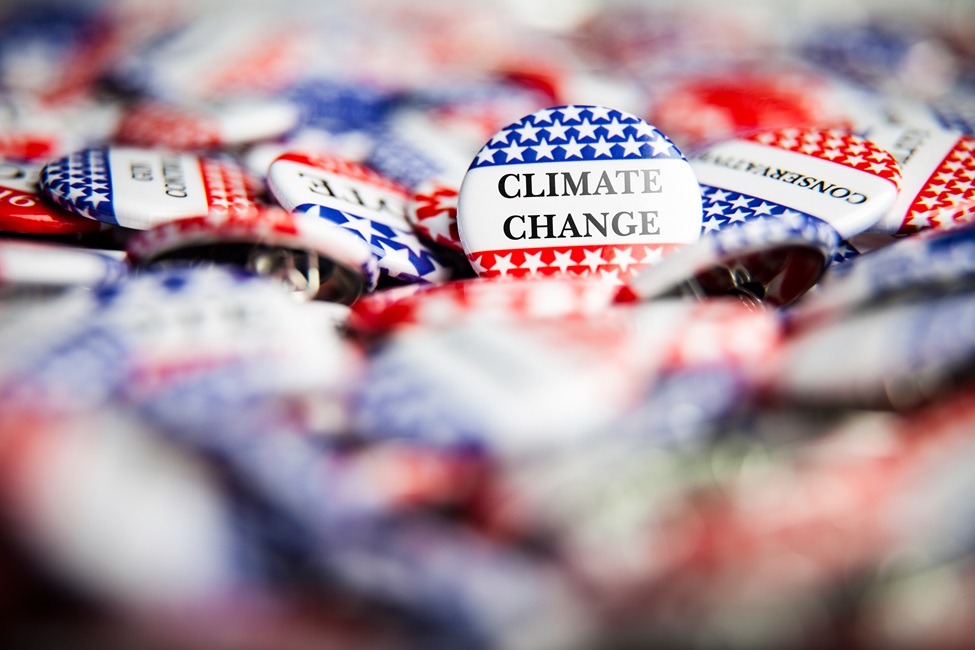Candidates Who Fight Climate Change Stand to Benefit in Election

The results of the survey, which was conducted before hurricanes Helene and Milton, showed that most Floridians want more government action on climate change.
A majority of Floridians expressed support for political candidates who fight climate change in a new Florida Atlantic University survey. The survey found that nearly 52% of respondents agreed that a candidate with a record of reducing climate impacts was more likely to get their vote.
The Invading Sea’s Florida Climate Survey also revealed strong support in the state for increasing renewable energy use and teaching climate science in K-12 classrooms. The survey is the 11th conducted by the FAU Center for Environmental Studies (CES) on Floridians’ opinions about climate-related issues since October 2019.
The results of the survey, which was conducted before hurricanes Helene and Milton, showed that most Floridians want more government action on climate change. About 68% agreed that the state should do more to address climate impacts, while 67% agreed that the federal government should do more.
“Floridians are experiencing enough of the weather challenges predicted by climate change researchers that a majority of adults in the state now see value in some kind of collective action to fight climate change,” said Colin Polsky, Ph.D., associate vice president of Broward Campuses for FAU and a professor of geosciences within the Charles E. Schmidt College of Science.
While the survey found majority support for candidates with a climate-fighting record, there were significant differences between respondents depending on their political party.
More than 74% of Democrats said they were more likely to vote for a candidate with a record of reducing the impacts of climate change, as compared to about 35% of Republicans and 39% of respondents with no party affiliation.
But the survey found strong support across party lines for renewable energy. About 75% of all respondents agreed with the statement that Florida should diversify its energy mix to include more electricity produced by renewable sources.
Broken down by party, 87% of Democrats, 68% of Republicans and 66% of respondents reporting no party affiliation agreed that Florida should use more renewable energy.
“The partisan split on climate in Florida appears to be growing, reversing the growing consensus we’ve observed in recent years. That said, when specific climate-related actions are discussed, such as increasing the share of solar in our electricity portfolios, voters are overwhelmingly supportive,” said Polsky. “Despite some climate policy progress in the face of polarization, we still need a ‘humble climate politics’ to advance to a stable trajectory of effective climate action.”
Respondents also reported concerns about the costs of electricity and insurance in Florida, with 73% concerned about home energy costs, while nearly 58% were concerned about being able to afford and maintain homeowners’ insurance due to climate change.
The survey found consistent results on several questions that have been asked since the survey started in 2019.
About 69% of Floridians believe climate science should be taught in K-12 schools, according to the latest survey. More than two-thirds of respondents have supported climate education in schools in 10 of the 11 surveys conducted since 2019.
And the latest survey also found that about 88% of Floridians believe that climate change is happening, a finding that has been around 90% of respondents in all prior FAU surveys.
“The existence of climate change is simply not up for debate in Florida,” Polsky said. “That question is settled based on our 11 surveys to date.”
Polsky is the former director of CES, which conducts the survey every spring and fall. The survey was renamed this fall after The Invading Sea (theinvadingsea.com), a nonpartisan environmental journalism website that is managed by CES.
The survey was conducted in English and Spanish from Sept. 4-6. The sample consisted of 1,400 Floridians, ages 18 and older, with a survey margin of error of +/- 2.53%.
For more information, survey results and full cross-tabulations, visit www.ces.fau.edu/ces-bepi/ or email cpolsky@fau.edu.
-FAU-
Latest News Desk
- Gutterman Center for Holocaust and Human Rights Honors EducatorsFlorida Atlantic University's Arthur and Emalie Gutterman Center for Holocaust and Human Rights Education (CHHRE) recently hosted its annual Educator Awards Dinner at the Boca Raton Marriott at Boca Center.
- FAU College of Business to Host Boca Finance & Real Estate ConferenceFAU's College of Business will host a specialized conference and networking event to offer an inside look at the future of finance and real estate as South Florida accelerates its rise as "Wall Street South."
- FAU's CAROSEL Offers New 'Spin' on Real-Time Water Quality MonitoringFAU Harbor Branch's CAROSEL is an autonomous underwater system that tracks nutrient exchanges between sediments and water in real time, revealing impacts on water quality and ecosystem health.
- FAU Engineering Receives $1.5M to Launch Ubicquia Innovation CenterThe Ubicquia Innovation Center for Intelligent Infrastructure will drive sensor, AI and analytics innovation to digitize and monitor infrastructure across utility, municipal, commercial and industrial sectors.
- BEPI Poll: Half of Floridians Consider Leaving Over Cost of LivingThe majority of Floridians are hanging on to the "American Dream," but rising housing costs and everyday expenses make it difficult to achieve, according to a new poll from Florida Atlantic University's BEPI.
- 'Frazzled' Fruit Flies Help Unravel How Neural Circuits Stay WiredFAU scientists have discovered that the protein Frazzled (DCC in humans) fine-tunes neuron connections, keeping signals fast and precise - key to a fruit fly's rapid escape reflex and healthy nervous system.






